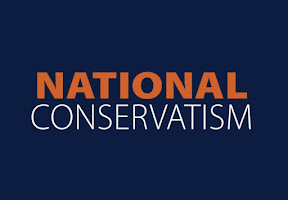National conservatism is objectionable on many counts — the name in itself tells you that — but it does pay tribute to free enterprise. A closer look, however, may cause one to doubt its commitment.
The movement’s official Statement of Principles includes Principle 6, which begins encouragingly, though predictably tradition-bound:
We believe that an economy based on private property and free enterprise is best suited to promoting the prosperity of the nation and accords with traditions of individual liberty that are central to the Anglo-American political tradition. We reject the socialist principle, which supposes that the economic activity of the nation can be conducted in accordance with a rational plan dictated by the state.
So far pretty good. When people are free to act peacefully, most will engage in the voluntary exchange of goods and services (including labor) to achieve better lives for themselves and their families. In the process they will acquire possessions the security of which is necessary to the pursuit of sustained, even lifelong projects of all kinds (and not only commercial) aimed at that betterment. In other words, free enterprise and free trade take place when we are left free to pursue our broad interests through peaceful social interaction and the division of labor. It’s a bottom-up, emergent environment that requires no coaxing from the government. (Historically, nonstate customary law emerged along with production, the division of labor, and trade. It did not wait for wise rulers to create an appropriate legal environment.)
But then the Statement of Principles starts its trek downhill: “[T]he free market cannot be absolute.”
This is ominous. First, it’s far from clear what that means. It should be obvious that no enthusiast of the free market thinks society ought to consist entirely of money-making. Life is more than production and trade of material values. Everyone knows that.
The sentence suggests to me that, according to the national conservatives (natcons), people — even when they restrict themselves to peaceful consensual activities — can’t be completely free of the cold hand of the state. The very rationale of the Statement tells us this. After all, these are the principles of “national conservativism.” It’s a nationalist movement. Its essential element is protecting the nation-state through the government. The existence of individuals is not denied, but their interests (as they conceive them) are subordinate to something called national interest. Individuals do not exist for their own sake. Therefore, every consideration is to be passed through the national interest filter. At bottom, then, national conservatism is a collectivist project. We cannot forget that, much less hope for an affinity between natcons and libertarians.
The concern with national interest prompts the question: as conceived by whom and by what criteria? The answer presumably is: according to the criteria of those who are elected to and are able to remain in office. The many problems posed by the perverse effects of democratic politics have been well-documented in theory and history. They include the impotence of any one vote, rational ignorance, rational irrationalism, concentrated benefits/thinly spread costs, inflated political transaction costs, apparently benign incrementalism, campaign theatricality, elites’ access to power, and limited accountability. So right from the start, the statement poses more questions than it answers. It does little to reassure people who place a priority on individual liberty. In short, it ignores public-choice economist James Buchanan’s call for “politics without romance.”
Politicians and bureaucrats, then, would be assigned the task of letting us know when we have, in their judgment, pursued market activities too much. Natcons declare themselves in favor of the rule of law, but remember: the content of the law is as important as due process. It’s not enough to be free from decrees handed down on the fly. We also need freedom from duly enacted oppressive legislation, that is, rules that forbid or specify the terms of consensual conduct.
“Economic policy must serve the general welfare of the nation,” the statement continues. Clearly, for national conservatives, it’s not enough that policy-makers abstain from violating the individual’s right to life, liberty, and the pursuit of happiness because through freedom, tradition may fall by the wayside, and the natcons can’t have that.
The best explainers of how markets work — I’m thinking of the Austrian economists — have shown that the general welfare is exactly what the pursuit of individual welfare in self-regulating markets accomplish. Adam Smith and his best predecessors understood this, even if they got some details wrong.
Let’s never forget that strictly speaking, markets don’t actually do anything. Only individual human beings act. When they act in a market setting, which is at once economic, legal, and cultural, it’s as if people are led by Adam Smith’s metaphorical “invisible hand” to do well for themselves by doing good for others. We must supply what others demand because bankruptcy awaits those who ignore others. Barred from government power and forbidden from using physical force and fraud directly, they will seek their own welfare by catering directly or indirectly to consumers. We may not always like what every consumer wants, but as long as no one can initiate force directly or through the state, we can secure ourselves, individually or in association with others, from undesirable influences.
Unsurprisingly, the natcons are dubious about globalism. That word means different things to different people, but the natcons don’t like even what libertarians mean: the free movement of people, goods, and money across national lines without government impetus or impediment — the division of labor writ large. Economists have long demonstrated that global welfare is best enhanced by that route. Significant, though incomplete moves in that direction over the last several decades have gone a long way toward wiping out absolute poverty and infant mortality.
The natcons, like the economic nationalists on the left, lament that “globalized markets allow hostile foreign powers to despoil America and other countries of their manufacturing capacity, weakening them economically and dividing them internally.” This is the “hollowed-out America” claim. The problem with the claim is that American factories still produce an incredible volume of goods. What’s changed is technology: many fewer people are needed to work in those factories because labor-saving computers and machines are far more productive than people working in jobs that not very long ago were condemned for their mind-numbing drudgery. Jobs that parents once hoped their children would never have to do are now looked to nostalgically by both the natcons and the Michel Moore left.
The Statement goes on:
Crony capitalism, the selective promotion of corporate profit-making by organs of state power, should be energetically exposed and opposed.
That sounds good, but the natcons will have to explain how their policies will avoid crony capitalism. Industrial policy, which is what the national conservatives really want, is an engraved invitation to well-connected business interests to the detriment of everyone else.
More could be said, but you get the idea. The Statement’s embrace of free enterprise is hollow indeed. Government intervention, complete with tariffs, import quotas, immigration restrictions, a military-industrial-science complex, and subsidies — all necessarily constituting de facto central planning — would be rampant, as would be the lobbying frenzy for special consideration. It’s no comfort to know that our rulers would be motivated by the national interest.

































